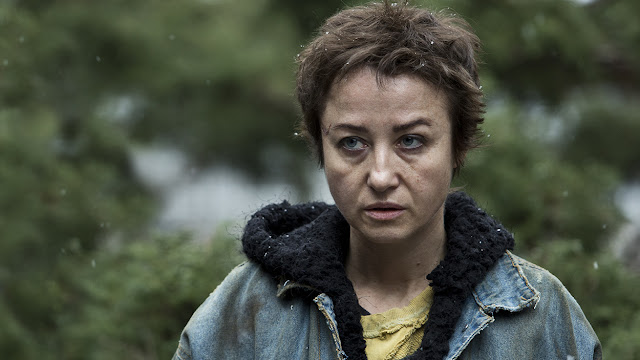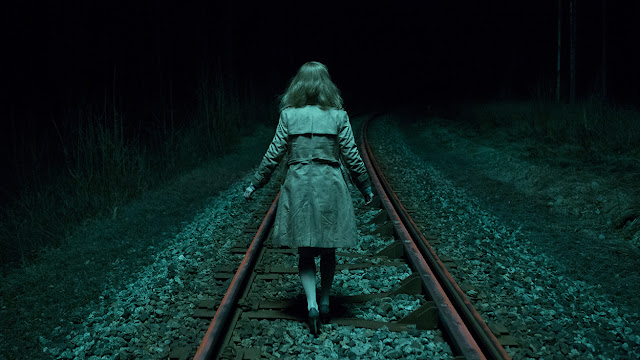Fugue, Polish director Agnieszka Smoczynska’s follow up to her coming-of-age mermaid-horror-musical The Lure, originally premiered in 2018, but is just now receiving a U.S. release. And it’s kind of a weird bird. It presents as a thriller—it looks and acts the part—but for all the aesthetic posturing, it ultimately boils down to a domestic drama, albeit an unusual one, about identity, love, family, and more. If anything, presenting as it does serves as a red herring or a subversion of expectations—it looks like one thing, but in reality, is something much different.
Two years after losing her memory in a dissociative fugue state, Alicja (Gabriela Muskala) learns that she’s actually Kinga, a small-town wife, mother, and school teacher. She’s plopped, largely against her will, back into those roles with her husband, Krzysztof (Lukasz Simlat), and young son. The wild, reckless Alicja clashes with the subdued domesticity of Kinga, and gradually the truth of what happened unfolds as she learns and remembers who she was and the two sides of her personality reconcile.
[Related Reading: 'The Lure' Movie Review]
At the core of Fugue is the idea of self, of identity. Which version is the real one? The person she was or the person she has become? Alicja is free-spirited, foul-mouthed and promiscuous and turbulent. She bristles and pushes back at the typical gender norms and restraint that define Kinga’s quiet life and existence. An outsider in her own home, she doesn’t recognize her own family, nor do they recognize her; she doesn’t even recognize herself as she sifts through the remains and rubble of her former life.
Multiple times the script, also written by star Muskala, uses typical thriller beats to toy with the audience. It hints that maybe something sinister is afoot—Krzysztof seems like he knows more than he let on, long lingering glances from Kinga’s old friend Ewa (Malagorzata Buczkowska) look loaded with meaning—but while those things are true, to degrees, it never takes the obvious path. There’s the central mystery of what happened to Kinga to unravel, and it does over time, but Fugue remains steadfastly more interested in the emotional journey of this rediscovery of the self, with the developing relationship between Kinga and her estranged family, and how each new revelation alters that.
[Related Reading: 'Demon' Movie Review]
Muskala is fantastic and embodies the inherent duality, the push and pull of her situation. Alicja has built up barbed-wire-topped walls around herself, slowly letting her guard down in this new, alien situation, and bonding anew with her child and husband, though as a completely different person. She captures the range, depth, and confusion of these feelings. With Krzysztof, Simlat is stuck in a similar dichotomy. On one hand, here’s his long-missing wife miraculously returned, while on the other, the person in front of him is a total stranger. It’s a spectrum and he deftly displays everything from tenderness to frustration with a near-impossible situation.
Smoczynska employs a few off-kilter and highly metaphorical visual flourishes, like a view of Alicja’s brain in an MRI that blossoms into flowers, or her repeated dreams of being buried. While interesting, they’re few and far between, clashing with the otherwise reality-based, though lovely, look and production design. It’s not enough to truly infuse them with any substantial meaning, and, like a handful subplots and side concerns in the slow-burn narrative build, never develop much weight or import.




No comments:
Post a Comment